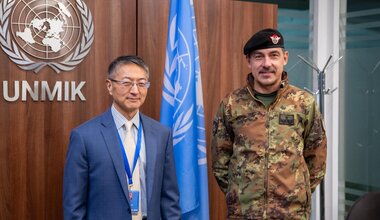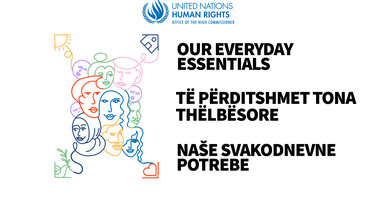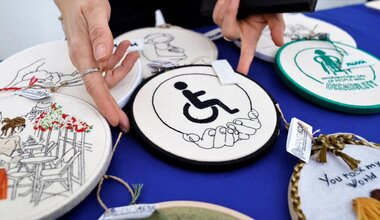22 Mar
2013
SRSG's presentation at the UN Security Council Session - 22 March 2013
Mr. President, Excellencies,
the report you have before you details the key events and the activities of UNMIK which took place from 16 October 2012 to 15 January 2013.
the report you have before you details the key events and the activities of UNMIK which took place from 16 October 2012 to 15 January 2013.
Unofficial Transcipt -
SRSG Farid Zarif
Presentation to the Security Council 22 March 2013
Mr. President, Excellencies,
The report you have before you details the key events and activities of UNMIK which took place from 16 October 2012 to 15 January 2013.
Since I last addressed you on 27 November, we have seen some important positive developments, thanks to the direct Belgrade-Pristina engagement in the high-level political dialogue facilitated by the European Union. Since October, Prime Ministers Ivica Dacic and Hashim Thaci, who are present today in this chamber, have met for a total of seven rounds of dialogue in Brussels. In addition, Presidents Tomislav Nikolic and Atifete Jahjaga met for the first time on 6 February as part of this same process, signifying the full political engagement of both sides. Together, these meetings have marked an essential -- indeed historic -- new chapter in the collective effort to overcome the legacy of the past conflict. The leaders involved have demonstrated political courage as well as foresight by their participation, and they deserve strong recognition for having embarked upon such a difficult yet indispensable process.
Progress has emerged from these meetings, in particular the most recent ones, the last of which took place only two days ago. Accordingly, I am most gratified that today the Council has the opportunity to take stock of their achievements thus far. Detailed discussions on further implementation of the Agreement on the Integrated Management of Crossing Points have addressed more complex questions, such as the management of fees and duties at the crossing points. The parties’ liaison officers are expected soon to begin work within the respective European Commission offices in Belgrade and Pristina. Discussions have more recently shifted to addressing the matter of Serbian institutions operating within Kosovo, as well as a range of difficult issues specific to the situation of northern Kosovo. It is my hope, that in this respect, the parties will remain steadfast in their determination to reach acceptable compromises on these most sensitive issues, and find viable solutions which will better serve the interests and aspirations of all communities living in Kosovo.
Concomitant with this period of encouraging political progress, significant challenges have also been faced on the ground, including adverse security incidents, as well as frequent instances of inflammatory rhetoric and posturing from different quarters. The latter have not only placed unhelpful strains on the atmosphere for the political process, but in some cases have also threatened efforts to ensure translation of agreements into practice. In the face of such developments, we have joined others in continuously urging both sides, not simply to remain committed to the dialogue, but also to more actively exert leadership to temper the emotions and reactions of their respective constituencies.
Mr. President,
In this light, I wish to stress today that, for this very vital political engagement to achieve its maximum potential, it needs to be accompanied by strenuous, constant, and coherent work on the ground, both by the mandated international presences and by local leaders. For our part, UNMIK continues to implement a broad based strategic review of all our activities, and enhancing functional coordination with our international partners. Our goal is to help ensure that the political process is reflected in -- as much as it is reflective of -- the realities we face daily in Kosovo.
I wish now to briefly highlight some key ongoing issues, where continued attention and action must accompany, and also complement, the steps being undertaken by those directly engaged in the political dialogue.
Episodes of increased tension in northern Kosovo were manifest both during the reporting period and the two months since. Some of these episodes were motivated, at least in part, by local confusion and misunderstandings about the substance of the political talks in Brussels. Unfortunately, this uncertainty was, at times, aggravated by very ill-considered statements from some local leaders. We and our partners continue to urge Belgrade and Pristina to significantly enhance their communication with the population living in the north. At the same time, we are urging political local leaders to act more responsibly, in a manner which may help protect the long-term interests of their constituencies. With all interlocutors, we have stressed the importance of basing their public assessments on strictly reliable information, and renouncing the chronic practices of inflammatory rhetoric and short-term point scoring.
In northern Mitrovica, there has been a very troubling and extended series of incidents involving the use of explosive devices, most of them apparently targeting properties. Sadly however, on 4 February, one such incident, in the northern Mitrovica mixed neighbourhood of “Three Towers”, resulted in light injuries by shrapnel to two children at play in their home. The family affected has since moved permanently away from the city.
A continuing lack of consensus concerning municipal authority in northern Mitrovica has also continued to cause volatility in the mixed areas. Competing assertions of authority by Mitrovica North Administrative Office as well as the parallel Kosovska Mitrovica municipality, continue to produce persistent tension and occasional confrontation on the ground. I am concerned that a stand-off over housing construction and reconstruction works, spearheaded by Mitrovica south municipality, in the area of Kroi-i-Vitakut/Brdjani neighbourhood of Zvecan municipality, may continue during the coming spring. As I have detailed in previous briefings, the cessation of budget allocations to UNMIK Administrative Office in Mitrovica (UAM) undermined the most functional channel available to address such problems in a consensual manner. Despite this development, my international staff are continuing to carry out important non-executive functions of UAM in the areas of local facilitation, conflict prevention and mediation. Coordinated preparations are underway, involving the EU Special Representative, OSCE, KFOR, ourselves and other mandated actors, to respond appropriately and collectively in order to prevent any adverse development in that area. It is very unfortunate and unacceptable that EULEX personnel continue to be constrained in their access to all areas necessary to fully discharge their mandate, particularly given that EULEX is now intensifying its focus on improved investigative practices.
Mr. President,
We are deeply distressed by the wave of vandalism and destruction which took place across Kosovo between 13 and 22 January, during which over 100 gravestones in several Serbian Orthodox cemeteries were damaged or destroyed, in some of the cases by use of explosives and firearms. During this same period, a monument dedicated to K-Serbs and K-Albanians killed during World War II was also destroyed using earth-mover, in broad daylight before an applauding crowd. These reprehensible actions were unbefitting Kosovo, as were some imprudent efforts to justify them in the press by making reference to actions undertaken elsewhere. In this respect, I was however, deeply gratified by an unambiguous and timely statement issued by the Kosovo Police. Representatives of the international community unanimously condemned such wanton acts and, together with UNMIK staff, were instrumental in encouraging more pro-active public responses from local as well as central political authorities. Further appropriate and very welcome actions have been taken by the Kosovo authorities, including the allocation of public funds for the repair and reconstruction of graves and monuments.
Understandably, the Serb community and Serbian Orthodox Church in Kosovo remain deeply concerned by the expressions of hatred and intolerance which accompanied these and other acts targeting Orthodox sites and symbols. Regrettably, the level of attendance at Orthodox Christmas services in some parts of Kosovo fell significantly following public threats and few protests organized by some radical groups in Kosovo.
The international community is particularly concerned by the continuing rejection by the municipal leadership in Dečani of a decision taken by the Special Chamber of the Supreme Court of Kosovo on 27 December. The decision rejected the claim over a parcel of land by two socially owned enterprises against Serbia and the Visoki Dečani Monastery. After summarily suspending relations with the monastic community, municipal leaders not only did far too little to restrain aggressive reactions against the court’s decision, but also effectively condoned them. Such reactions included an attempt by a handful of demonstrators to enter the grounds of Visoki Dečani on February 8, as well as several attempts to place offensive placards on its walls. Supported by KFOR, the Kosovo police have so far been able to prevent harm coming to the Monastery; however, much stronger leadership from politicians and public officials is needed to demonstrate that universal values and respect for the rule of law will be defended in practice.
Too many serious crimes in northern Kosovo, as well as those affecting communities in the rest of Kosovo, continue to go unresolved and remain a matter of very sober concern. Judicial performance in Kosovo continues to be another significant stumbling block, aside from the political disputes. These issues were amply highlighted in the most recent report of the European Commission to the European Parliament and Council on progress in fulfilling requirements for a visa liberalisation roadmap. Unresolved cases inevitably become subject of political manipulation, as well as lead to a buildup of public frustration.
Mr. President,
The political dialogue is at a critical stage, and the parties are poised to make fundamental progress. Alongside this, stability on the ground remains fragile, and is likely to continue to remain so while these talks delve into topics which are, at once, the most sensitive and the most essential. I trust that the progress being achieved will be welcomed by the members of this august Council, and that you will moreover offer unequivocal support to the parties to remain steadfast, regardless of the inevitable challenges and setbacks along the way. Likewise, the international community should be well prepared to place its collective weight and support behind all agreements reached mutually by the parties, and to fully support their implementation.
As I have outlined today –and also detailed in the report –incidents and tensions continue to occur on the ground, underscoring the need for energy and effort to be rededicated by all international presences, alongside the negotiations. Simply, it is imperative that the inevitable problems and setbacks on the ground, however difficult they may be for those affected, are not permitted to undermine the atmosphere and the potential for progress in the vital political talks.
I ask you to pursue opportunities to make use of your authority and influence with political leaders on all sides, to send clear and unified signals regarding your high expectations, and equally of your readiness to support and reward constructive actions. Far too much is at stake to permit short-term political challenges, anxieties and setbacks to put at risk the fundamental and historic opportunity which now stands before the parties. Effective, efficient and coherent work by all international presences is needed to promote and sustain the conditions in which political talks may achieve their true potential.
Mr President,
I wish to conclude my remarks today by thanking you and all the members of the Security Council for your close attention and support to the work of UNMIK, including for our efforts to correctly tailor our contributions to the evolving circumstances on the ground.
Thank you very much Mr President.
 UN
UN United Nations Peacekeeping
United Nations Peacekeeping





